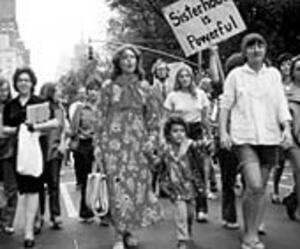Jewish Women in Civil Rights - Trudy Orris
Biography
Gertrude "Trudy" Orris was born in Greenwich Village in 1916. She was one of two Jewish students in her school and experienced anti-Semitism as a child. Toward the end of WWII, Trudy's husband was drafted to serve in the Army Medical Corps in Germany. They lived together in Munich right after the war, and spent two years in Germany, which Trudy describes as "a very emotional experience for me as a Jew." The experience matured Trudy and solidified her commitment to return to the United States to work against racism. "When I came back to the United States," notes Orris, "I was a different person. I felt that the most important thing that I could do is to work in the Black movement. If anything happened, then somebody didn't have to say to me, what did you do?"
Back in the U.S., Orris attended local civil rights demonstrations and went South with her sixteen-year-old son to participate in desegregation demonstrations at Gwynne Oaks amusement park in Maryland. Both she and her two children went South a number of times to work on desegregation and voting rights. At home, she also worked with Dr. Walter Lear to bring students up from the South to do fundraising for Student Nonviolent Coordinating Committee (SNCC) and also to get them medical care. Later, Orris brought national attention and resources to the southern movement as one of the founders of the New York Parents of SNCC group.
Trudy remains very politically active. She has been a member of the Women's International League for Peace and Freedom for over twenty years. She is also active in WREE--Women for Racial and Economic Equality. She belongs to a group called National Alliance, which has been fighting for the rights of Black political prisoners. She is also interested in women political prisoners and lifting the embargo on Cuba. Still involved in many causes, she remains proud of her work in the civil rights movement, and proud of her values as a Communist.
Interview
Gertrude Orris, much to her family's distress, insisted on going down to Selma for a week. "They kept calling, they were so worried about me they wanted me to come [home]... I had to [go]. That was one of the things I had to do. So I went by myself." Orris stayed with the doctors' group in Selma:
During the day we would go to the march. We were responsible for the medical staff on the march. There were people walking distances, and so we would wash feet, we would put Band-Aids on. They were the doctors and I was helping the nurse. Then I would go back to the house and I would do the cooking. Somebody would've shopped, and I would make some of the meals. A lot of them went out to eat. We'd stay in the Black community.



